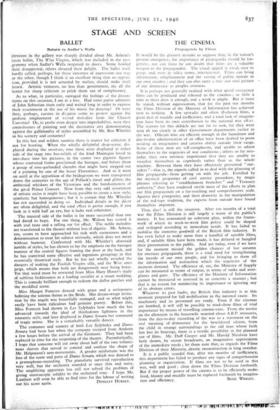THE CINEMA
Propaganda by Films
IT would be the greatest mistake to suppose that, in the nation's present emergency, the importance of propaganda should be for- gotten ; nor can there .be any doubt that films are a valuable
weapon to the propagandist. The visual appeal is vivid, easy to grasp, and, even in talkie terms, international. Films can bring information, enlightenment and the raising of public morale in our own country ; and they can also carry a true and vital picture of our democracy to peoples overseas.
It is perhaps not generally realised with what speed emergency films can be produced and released to the cinemas ; as little a time as three days is enough, and a week is ample. But it must be stated, without equivocation, that for the past ten months the Films Division of the Ministry of Information has achieved next to nothing. A few sporadic and often ill-chosen films, a great deal of muddle and inefficiency, and a total lack of imagina- tion have been its own contribution to the national war effort.
The reasons for this clad& are not far to seek, for they were seen all too clearly in other Government departments earlier in
the war. Officials who are efficient enough in the humdrum and day-to-day administration of an office have been drafted to posts needing an imaginative and creative ability outside their range.
Some of these men are self-complacent, and unable to adjust themselves to the urgencies of war conditions ; others so far mis- judge their own intrinsic importance that they arc unable to visualise themselves as cogwheels rather than as the whole machine. Between them they have effectively prevented " out- siders "—that is, the experts called in to deal with the planning of film propaganda—from getting on with the job. Fortified by
the mystical properties of civil service procedure, by magic
phrases referring to " establishment branches " and " Treasury authority," they have rendered sterile most of the efforts to plan our film propaganda on a far-reaching and comprehensive scale. Against their pomposity, and their dexterity in the manipulation of the red-tape tradition, the experts from outside have found themselves impotent.
That, alas! is still the situation. After ten months of a total war the Films Division is still largely a waste of the public's money. It has announced no coherent plan, within the frame- work of which its week-to-week film policy could be shaped and reshaped according to immediate needs. It has failed to mobilise the immense goodwill of the British film industry. It has even failed to make more than a handful of suitable films, and, if suitable films have been made, it has delayed or bungled their presentation to the public. And yet today, even if we have for the moment missed the golden chances of last autumn for overseas propaganda, there is a vital need for strengthening the morale of our own people, and for bringing to them all the information and instruction which the urgencies of the moment demand. The efficiency of, say, the Ministry of Supply can be measured in terms of output, in terms of tanks and aero- planes and guns. The efficiency of the Ministry of Information cannot be measured or assessed in so concrete a manner ; but that is no reason for minimising its importance or ignoring any of its obvious errors.
Whatever its past faults, the British film industry is at this moment prepared for full mobilisation in the national cause. Its machinery and its personnel are ready. Even if the cinemas are bombed, it will still be possible to road-show films of vital importance by means of travelling cinema-vans. From the novice on the allotment to the housewife worried about A.R.P. measures, from the day-to-day recording of the war to a statement on the real meaning of democracy for the bewildered citizen, from the child in strange surroundings to the old man whose faith has lost its bearings, there is a terrific possibility in the planned use of films. Mr. Duff Cooper and Mr. Harold Nicolson have both shown, by recent broadcasts, an imaginative appreciation of the immediate needs ; let them note that, as regards the Films Division of their Ministry, drastic reconstruction is long overdue. It is a public scandal that, after ten months of inefficiency, this department has failed to produce any signs of comprehensive planning or organisation. If films arc not to be used in this war, well and good ; close down the Films Division forthwith. But if the proper power of the cinema is to be efficiently mobi- lised, bluster and muddle must be replaced forthwith by imagina-






























 Previous page
Previous page